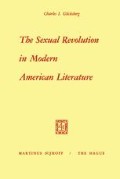Abstract
Though the theme of love is universal and appears in world literature from Homer and Cervantes to Henry James and William Faulkner, the closely related theme of sexuality has, in the past history of American culture, been glossed over with genteel circumlocutions or been discreetly omitted. It is these euphemistic evasions or strategic omissions that point to the moral taboos of a given age and to the values society ostensibly abides by. Not that writers are as a profession inclined to be mealy-mouthed Puritans. The shades of Rabelais, Fielding, Robert Burns, Jonathan Swift, Baudelaire, and Flaubert bear eloquent witness to the contrary. The history of literature is replete with accounts of stormy rebels who formulated new standards of conduct based on what they considered to be a truer conception of man. But in the main literature reflects the mores and conventions of its age.
Access this chapter
Tax calculation will be finalised at checkout
Purchases are for personal use only
Preview
Unable to display preview. Download preview PDF.
References
Henry Adams, The Education of Henry Adams. Boston and New York: Houghton Mifflin Company, 1918, p. 385.
William Dean Howells, My Literary Passions. New York and London: Harper & Brothers, 1895, p. 43.
Everett Carter, Howells and the Age of Realism. Philadelphia and New York. 1954, p. 141.
Norman St. John-Stevas, Obscenity and the Law . London: Secker & Warburg. 1956, p. 30.
William G. Frierson, “George Moore Compromised with the Victorians,” The Trollopian, March 1941, Number Four, p. 38.
“Womanliness came to mean sexlessness and in the 1840’s and later, fiction relied on this conviction wherever it presented an ideal woman.” William Wasserstrom, Heiress of All the Ages . Minneapolis: The University of Minnesota Press, 1959, p. 24.
“Manhattan Transfer, with its unrelated scenes selected to portray the more sordid aspects of New York, and with its spattered filth, might be described in a phrase as an explosion in a cesspool.” Paul Elmer More. The Demon of the Absolute. Princeton: Princeton University Press, 1928, p. 63.
Mario Praz, The Romantic Agony. Translated by Angus Davidson. New York: Meridian Books, 1956, p. vii.
Conrad Aiken, Ushant . New York and Boston: Duell, Sloan and Pearce, 1952, p. 213.
Floyd Dell, Homecoming. New York: Farrar & Rinehart, Inc., 1933, p. 242.
Author information
Authors and Affiliations
Rights and permissions
Copyright information
© 1971 Martinus Nijhoff, The Hague, Netherlands
About this chapter
Cite this chapter
Glicksberg, C.I. (1971). The Forerunners of Revolt. In: The Sexual Revolution in Modern American Literature. Springer, Dordrecht. https://doi.org/10.1007/978-94-010-3236-0_3
Download citation
DOI: https://doi.org/10.1007/978-94-010-3236-0_3
Publisher Name: Springer, Dordrecht
Print ISBN: 978-90-247-5036-8
Online ISBN: 978-94-010-3236-0
eBook Packages: Springer Book Archive

